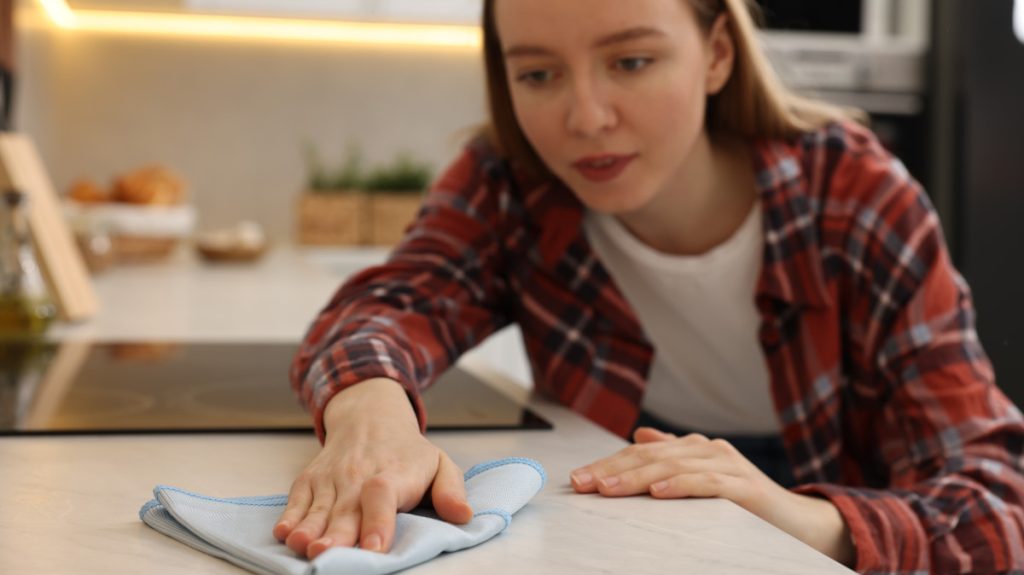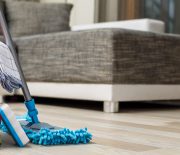Last update: 1 year ago

Isn’t it amazing how natural stone brings such warmth and elegance to our living spaces? Marble, in particular, is like a timeless piece of art in our kitchens and bathrooms. However, as stunning as it is, marble can be a bit delicate despite its durability. That’s why we should treat it with the loving care it deserves to protect it.
In this article:
- Prepare the cleaning materials beforehand
- How to clean marble countertops
- Do and don’ts of cleaning marble countertops
- Daily cleaning routine
- Dealing with specific stains
- Polishing your marble countertop
- Seal your marble countertop
- Preventing damage
- Professional maintenance
- Takeaways
Prepare the cleaning materials beforehand
Here are expert-recommended steps for cleaning marble countertops effectively:
What you will need:
- Dry microfiber cloth
- Damp cloth
- Dust mop
- #0000 steel wool
- Spray bottle
- Mild dish soap
- Neutral pH stone cleaner
- Liquid cleanser (12% hydrogen peroxide and 3% hydrogen peroxide)
- Marble sealant
- Marble polishing powder
- Baking soda / Ammonia and hydrogen peroxide
These cleaning products are the best way to clean and maintain marble countertops, marble floors, marble furniture, and other marble surfaces.
How to clean marble countertops
First, make sure any new cleaning product or method is compatible with your marble countertops by testing it in a small, inconspicuous area first.
The cleaning process step by step:
- Clean the countertop first by removing any items, debris, or spills that may hinder the cleaning process. Remove any loose dirt and dust from the marble with a soft, damp cloth.
- Fill a bowl or container with warm water, then stir in a small amount of dish soap. If mild dish soap doesn’t work, consider a pH-neutral cleaner made specifically for marble surfaces.
- Pour one tablespoon of dish soap or pH cleaner per gallon of warm water. The marble surface should be clean after this without being damaged.
- Wet the microfiber cloth or sponge with the cleaning solution, then wring it out to remove any excess water.
- Gently wipe down the marble countertop. Pay close attention to any areas that have stains or spills.
- Allow the cleaning solution to stay on the affected area for a few minutes to help loosen them.
- Give the countertops a good rinse with clean water to remove any residue.
- Dry the marble surface completely with a soft, dry cloth to prevent water spots.
Do and don’ts of cleaning marble countertops
Actually, taking care of marble is not as complicated as it sounds. However, there are a few things you should keep in mind.
The Dos
- DO wipe up spills right away. Always clean up lemon juice, tomato sauce, and other acidic substances right away.
- DO quick-clean marble every single day.
- DO use a trivet when placing hot dishes on marble counters.
- DO use soft clothes to clean the marble.
The Don’ts
- DON’T clean marble with white vinegar or lemon. Although they are very effective cleaners for many surfaces, they can actually etch marble.
- DON’T forget to use a coaster. Resting water can leave marks.
- DON’T use bleach because it will seriously damage the marble.
- DON’T allow your kids to use the marble area as a play area for games with Play-Doh. The dyes used to colour it can seep into the marble.
Daily cleaning routine
Your daily cleaning routine should consist of wiping the marble surface with a soft cloth and warm water. For tougher messes, use a mild soap or stone cleaner recommended specifically for marble. Remember to always dry the surface thoroughly to prevent any water stains. It is also recommended to reseal your marble every 3-6 months to protect it from any potential staining or damage. With proper care, your marble will maintain its luster and beauty for years to come.
- Regular cleaning – Wipe down marble countertops daily with a soft, damp cloth to remove surface debris and spills promptly. This prevents stains and maintains the countertop’s natural shine.
- Avoid abrasive materials – Never use abrasive sponges, hard bristles, or scouring pads on marble, as they can scratch the marble surface and dull its finish. Use a soft microfiber cloth or soft-bristle brush to dust your surface, and choose a soft-head toothbrush to get dirt and grit out of corners.
- Blot spills – If a spill occurs, blot it immediately with a clean, soft cloth to prevent the liquid from penetrating the marble pores and causing stains.
Appropriate cleaning solutions for marble:
- Neutral pH stone cleaner – For when marble cleaning requires a little more than just soap and water.
- Liquid cleanser – 12% hydrogen peroxide and 3% hydrogen peroxide for tougher stains.
- Marble sealant – Opt for a food-safe formula.
One of the easiest methods for cleaning marble is by mixing a few drops of dish soap with hot water in a spray bottle. Simply spray the marble surface with the solution and wipe it down using a microfiber cloth. Afterwards, use a separate clean cloth to ensure the surface is thoroughly dried, as water can leave unwanted marks on the marble. By following these simple steps, you can safely clean, polish, and seal your marble countertops, ensuring they maintain their stunning appearance for years to come.
Dealing with specific stains
Here is how you can remove some specific stains from your marble:
- Rust, coffee or wine – Make a thick paste out of baking soda and a small amount of water. Apply the paste to the stained area, cover it with plastic wrap, and let it sit overnight. Rinse with water and pat dry.
- Oil stains – Sprinkle corn starch on the stained area and let it sit for 15 minutes. Wipe the marble clean with a soft cloth to clean up the corn starch and stain.
- Marble etching – Acids, such as lemon juice, vinegar, and tomato sauce, can cause etching or dulling on marble. To remove these marks in the stone, rub the etched area with dry, super fine grade #0000 steel wool. Anything deeper than surface level scratches will require a professional’s help.
- Organic stains, like food – For them, the Natural Stone Institute recommends cleaning with a solution of 12% hydrogen peroxide and a few drops of ammonia or a paste created by mixing one part of 3% hydrogen peroxide with two parts baking soda. Apply the paste to the stain, let it sit for a few minutes, then scrub it off, and rinse and dry the area.
If you are unsure whether you can remove a stain from a marble surface on your own, it may be time to hire a professional. With stains, it is often better to be left to a professional, who knows which commercial poultice to use and how strong to make it based on the stone and colour.
Polishing your marble countertop
- Eco-friendly home made polishes – The best way to use natural polish is with baking soda. Use a mixture of baking soda and water as a polish. Combine (45 g) of baking soda with (0.9 L) of water and mix well. Then, using a clean cloth, apply the solution to your surface in a thin layer. Allow to dry for about 5-6 hours.
- High-quality commercial stone polishes – Whatever you find in the store. It can be in the form of powder, creams, or sprays. Follow the product instructions for the recommended application method.
Once the marble countertop or other marble surface is dry, finish off by buffing with a chamois to fully restore the shine.
Seal your marble countertop
When it comes to a sealing schedule, not all marble is the same. The frequency is determined by the level of care, the location of the marble, and the level of traffic in the surrounding area. To keep high-traffic areas like the kitchen, bar, and shower in top condition, apply a sealer once a year. But keep in mind that a marble sealer isn’t forever. And you’ll have to treat your marble several times. The sealer will eventually wear off due to use and daily cleaning.
How do you know if you need to reseal a marble surface? Check for water rings, spots, or stains on your marble surface. Water is not a problem if the marble is sealed properly. If water leaves ring marks, it indicates that the stone needs to be sealed.
Preventing damage
- Use cutting boards – Place cutting boards or mats under knives and other sharp objects to avoid scratching the marble surface.
- Avoid hot items – Use trivets or coasters under hot pans and dishes to prevent thermal damage to the marble.
Professional maintenance
Schedule professional marble polishing and sealing every few years to restore the countertop’s luster and protect it from damage. If you’re unsure about cleaning or treating a specific stain, consult with marble cleaning professionals to avoid causing further damage.
By following these expert tips for cleaning marble countertops, you can preserve their beauty and ensure they remain a stunning focal point in your home for years to come.
Takeaways
- Marble is a beautiful but delicate stone that requires special care to maintain its appearance.
- Avoid using acidic cleaners, such as vinegar or lemon juice, as they can damage the marble.
- Clean marble countertops daily with a soft, damp cloth to remove surface debris and spills promptly.
- For tougher stains, use a neutral pH stone cleaner or a liquid cleanser made with 12% hydrogen peroxide and 3% hydrogen peroxide.
- Seal marble countertops once a year to protect them from water damage and staining.
What methods have you tried to clean your marble countertops?








